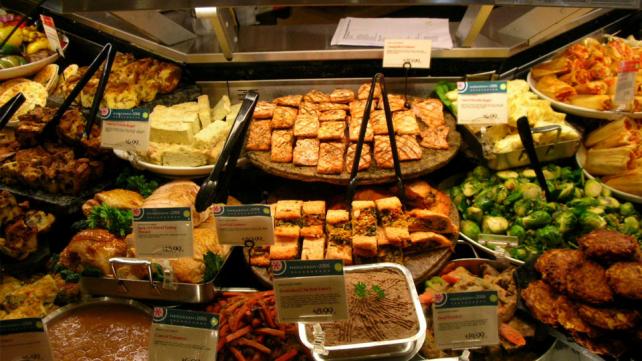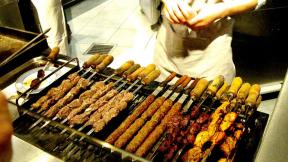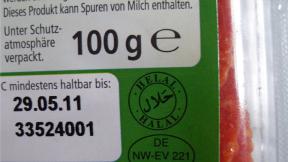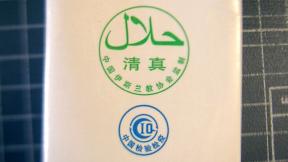
Often times Muslim consumers tend to assume 'Kosher' is similar to 'Halal'. Although the slaughtering rituals of Jewish people resemble those of Muslims; kosher and halal are two different entities carrying a different meaning and spirit. Muslims, therefore, are provided with the following basic information about Kosher so they can exercise care in distinguishing halal from kosher.
Kashrut (in Hebrew) is the system of Jewish dietary laws. Kosher (kashur in Hebrew) means 'fit, or proper for use' according to Jewish law. Examples of kosher are: the meat of the 'fore quarter*' of the cattle slaughtered ritually, fruits, vegetables, all fish that have fins*, Kosher wines*, Kosher cheeses*, Kosher gelatin*.
The opposite of Kosher, as applied to food in Treif (in Yiddish), or trefah (in Hebrew) meaning 'not suitable for use', or 'forbidden'. Trefah literally means 'torn by a wild beast' (Exodus 22:30). Examples of Trefah are: blood, swine, rabbit*, all shell fish*, wild birds such as wild hen*, wild duck*, and the birds of prey.
(*) These food items exhibit a marked difference between kosher and Halal as well as trefah and haram. The differences are explained elsewhere in this section.
Caution to Muslim Consumers:
Halal is a comprehensive Islamic term encompassing not only the matters of food and drink, but all other matters of daily life. Islam being the final and perfect way of life for humanity, it supersedes all the previously revealed religions including Christianity and Judaism. The rituals in all matters were perfected by God (al-Quran 5:3)
According to Islamic Jurisprudence, no one except God can change forbidden (Haram) things into lawful (halal) for vice-versa. It is forbidden for people to change the lawful (Halal) things into unlawful (Haram), or vice-versa.
Halal is a unique Islamic concept and eating zabiha (Islamically slaughtered) meat is a distinguishing part of a Muslim's identity as expressed by Prophet Muhammad, peace and blessings be upon him.
Salient differences between kosher and halal are:
Islam prohibits all intoxicating alcohols, liquors, wines and drugs. kashrut regards their wines kosher. Hence food items and drinks showing the kosher symbol containing alcohol are not halal.
Gelatin is considered Kosher by many Jews regardless of its source of origin. If the gelatin is prepared from non-zabiha, Muslims consider it haram (prohibited). Hence foods items such as marshmallows, yogurt, etc., showing kosher symbols are not always halal.
Enzymes (irrespective of their sources even from non-kosher animals) in cheese making are considered mere secretion (pirsah b'almah) according to some kashrut organizations, hence all cheeses are considered kosher by many Jews. Muslims look for the source of the enzyme in cheese making. If it is coming from the swine, it is considered haram(forbidden). Hence cheeses showing kosher symbols may not be halal.
Jews do not pronounce the name of God on each animal while slaughtering. They feel that uttering the name of God, out of context, is wasteful. Muslims on the other hand pronounce the name of Allah on all animals while slaughtering.
The salient differences between kosher and halal have been illustrated so that Muslim consumers can distinguish halal from kosher.
Muslims in non-Muslim countries should strive to follow the Islamic injunctions in their diet (as well as in every walk of life) and establish their own businesses and institutions to cater to the needs of the Muslim Ummah. By doing so, not only the identity of the Muslims will be preserved, but they will be recognized and respected for their beliefs and practices.
Differences within Kosher:
There are different sects within Judaism and there are several hundred Jewish Kosher authorities in the US who certify Kosher based on extremely liberal to extremely conservative rules. Therefore it is difficult to come up with one uniform opinion regarding Kosher practices. A symbols "k" for kosher is not governed by any authority. Any manufacturer can use it at will. A website guiding Jews about Kosher states "it may take a great deal of detective work to ascertain the standard that a particular rabbi is using." For this reason many Muslims when buying anything kosher look for "u" in a circle which are more conservative Kosher symbol.
"Hanukkah dishes" by Ms Jones from California, USA - Happy Hanukkah!. Licensed under Creative Commons Attribution 2.0 via Wikimedia Commons - http://commons.wikimedia.org/wiki/File:Hanukkah_dishes.jpg#mediaviewer/File:Hanukkah_dishes.jpg








Comments
Hi. FYI, under kosher laws, Geletine from a pig is NOT kosher, nor is all wine - there are kosher wines as well as everything else. Thanks.
Location
even if halal meat is on which the name of ALLAH was pronounced on the time of slaughter, while kosher doesn't require this; is such KOSHER meat still HALAL and acceptable for muslims. pls comment with strong logic and references..thanks
Location
I found the article plus the comments very informative(esp the comments!).In this age and era, where information is easy to find, we have to verify the information provided.
Location
While the article was interesting the facts need to be presented correctly before the article is produced. We have to be held accountable amongst our sisters and brothers like we are by Allah (Subhanna Wa'Tala). It is a disappointment that so many sites related to Halal and Haram foods and ingredients are bashing the Kosher Gelatin and Kosher Cheeses. The Gelatin and the Milk Products cannot come from Non-Kosher sources. People rely highly on this information to purchase healthy foods for their families. It is important to have your facts straight. It is already very difficult to shop (affordably) in America, we need to be much more careful about the information we hand out so eagerly.
Location
I found your article through google, while I was looking for projects which have tried to provide both food that is both kosher and haram. Your page of differences is interesting, though I believe somewhat inaccurate. Google for kosher gelatiin and you'll find that kosher gelatin may not come from non-kosher animals and you'll also realize that like many other elements of Judaism, what is kosher is subject to real debate.I would not go into a kosher butcher to buy kosher milk. A question I have, is given the differences between kosher and halal, is there a way to produce kosher AND halal meat and is there an economically rewarding market for that?
Location
I thank Alleh very much to have someone like you to provide such good information. Jazaak alleh khair.
Location
Correction:1) Grape wine is only considered Kosher if it is produced by religious Jews.2) Kosher certifying agencies require that Kosher cheese be made using rennet (enzymes) from Kosher animals that have been ritually slaughtered or with rennet from microbial sources.3) Gelatin is only certified as Kosher if it comes from Kosher animals. Some gelatin manufacturers have labeled their (non-Kosher) products with a "K" to claim that they were Kosher although no Rabbis had certified the product as Kosher.4) Kosher fish must have BOTH fins and scales.
Location
Pages
Add new comment